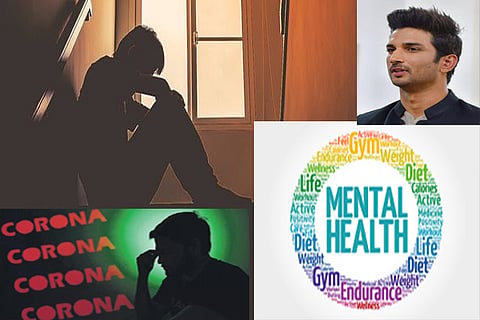

Chennai
“Suicide is a result of three factors – the pre-existing mental health condition, economic duress, and the lack of a social support system. These three in tandem or individually can push even someone as a well-loved actor to end their life,” says Dr Ennapadam S Krishnamoorthy, psychologist and founder of Buddhi Clinic.
Mental health professionals report that the number of people approaching them for help has increased over the course of the shutdown. “Due to the increased awareness among the younger generation as well as the accessibility of telecommunication or virtual communication, many are dropping their stigma of mental health counselling. People who were hesitant to open up are now sharing their concerns for the future, be it personal or job-related,” says psychiatrist Dr Vivian Kapil.
Many of the cases are related to anxiety, domestic abuse, or children’s concerns surrounding their futures and examinations. Terming the mental health issues as a ‘pandemic within a pandemic’, Dr Vasanth R, consultant psychiatrist, Fortis Malar Hospital, says that even patients who had stopped treatment returned after symptoms and triggers resurfaced. “The requirement to continuously wash your hands is something that can trigger a patient with Obsessive-Compulsive Disorder to have a resurgence of those tendencies.
Those with anxiety issues are also seeing a resurgence of symptoms. It is getting difficult for many to draw the line between what is needed for the pandemic and what is needed for their mental health. This is also seen by those who work from home, and are unable to strike a work-life balance,” he points out.
Social media has proven to be a boon in connecting and reaching out to people, experts say. The instant communication as well as the younger generation’s preference for virtual conversation have ensured that many stay in touch with loved ones and keeping a check on them. However, Dr Krishnamoorthy states that the constant information and misinformation have also caused anxiety in many.
“Sushant’s death has reminded us of suicide as a public health issue, and also how important it is for us to be aware of how people around us feel. If we sense trouble, we need to reach out and talk to them about their concerns, especially at this time,” he says.
The long-term mental-health repercussions of the shutdown are yet to be seen, but professionals feel those who have suffered personal losses of life might suffer from PTSD, while others might go through depression.
“Unlike natural disasters, pandemic will not have an end. It will be a gradual decrease. And even then, life will not return to normal, and we will see a surge in cases of people for mental health help,” adds Dr Kapil.
Visit news.dtnext.in to explore our interactive epaper!
Download the DT Next app for more exciting features!
Click here for iOS
Click here for Android